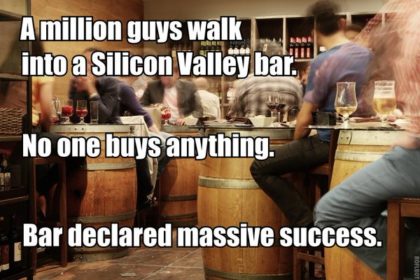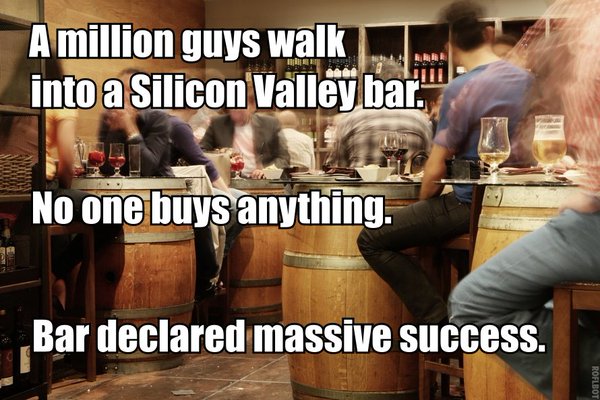
Yes it’s a buzzfeed style headline but it’s a question I get asked so frequently that I need a reference as much as you might.
My reply:
- Roadmap
- Human Resources
- Capital Resources
I will never be convinced that the most successful startups are a result of a CEO focused on and exceptional at anything else.
For all the tactical advice that you hear, that startups need to focus on customers, revenue, building something, validation, testing, etc., the engagement of investors in startups seems to be driven by teams of THREE founders more than two.
Now, before I clarify what I mean by that, please appreciate that I don’t mean that there are always necessarily 3 founders…. and of course many of the well known successful ventures are known for the 2 or maybe even 1. My point is that investors (in whom, whether you like the idea of seeking investment or not, we always see more substantial tech companies by way of those with investors) focus on exceptional teams (they probably know something).
So, what does such a team need to be capable of doing?
- Building something new
- Selling it
- Knowing the market and planning to address it
I moved from Silicon Valley’s startup community to Austin’s a few years ago.
(I realize I’ve still not made my point about 3 founders… stay with me)
The glaring difference between Silicon Valley and Austin startups is that one place favors one of those things over the other. While the other place favors the opposite.
Many of us working in venture capital development are confident that that difference ALONE is what results in companies of distinct pace, size, and appeal:
- Silicon Valley favors the 3rd bullet over the 2nd
- Austin favors the 2nd bullet over the 3rd
Follow me? Silicon Valley startups almost to a fault focus on the market. Market share. Growth and audience. Marketing. It’s why we have the undertone commentary in our economy… ”how can Silicon Valley companies be valued at so much when they don’t have any customers??”

Yes. You know why? Because any business that get a million people in the door can monetize them somehow or certainly be acquired so someone else can figure out what to do with that. That quote is a tongue in cheek jab at Silicon Valley and yet anyone with half a brain would LOVE to own that bar.
The bars that fail to result in any substantial value for anyone involved are the ones with a handful of loyal patrons drawn back for Thursday Karaoke. Sure, it’s “succeeding” but when the owner retires or dies, so too likely will the bar unless someone takes it over for pennies on the dollar.
The focus on the market getting a million in the door and then selling to them
Austin startups (certainly to a fault) favor customers, sales, revenue. Selling it. Often oblivious to the market (competitors, etc.) even in our own back yard.
Many reasons that’s the case. The Valley was built long before the Lean Startup ideas encouraging customer validation so it’s posited that the Lean Startup concepts of customers and validation has more influence over the newer startup markets. Marketing experience in the Valley is based in the internet while elsewhere it isn’t as much so. It could be that Austin just doesn’t have as much experienced and significant venture capital available to entrepreneurs and thus they indeed must chase revenue more aggressively… who knows, we’re not having that discussion in detail here.
The point is that the distinction between the regions can then be traced back to what those founding teams (and thus the CEO) do.
Austin: Build something > Sell Something
Silicon Valley: Know the market > Build what it wants
You can tease out of that what the CEO should be doing.
Consider that Marketing and Dev are two VERY critical skillsets with distinct training and experience. Most people can’t do actual marketing (even though they believe they are or consider their Adwords campaign, marketing) any more than most people can just sit a computer and code.
So Silicon Valley’s team is comprised of that very experienced and focused Marketing role, the innovative technical genius, and a CEO who’s left to…. SELL IT.
Contrast that with the Austin team gets the Technical genius and then the CEO (if they’re not that) is, too, focused on selling BUT with marketing an afterthought, the CEO typically isn’t selling to the actual market nor understanding what the market wants – they’re aggressively selling to customers. Seeking validation and revenue.
So what’s the dream team of a startup? Whether actual 3 founders or not (maybe a first hire, etc.): CEO, CMO, CTO
And the CEO of such a capable team is going to get out of the way of the people who know how to build the business. The CEO of a startup destined to be successful is selling it but they’re not selling the product; they’re selling the vision. They’re fostering the demand for what’s being done so that the CTO and CMO have the resources they need to be successful.
Think about the notable tech CEOs/founders that immediately come to mind. Sure, some were/are engineers but all of them – Musk, Gates, Zuck, Page/Brin, etc. – make people WANT what they are doing. Those leaders aren’t doing the marketing or leading the development, they inspire people to work for that entity, fund their startup, and providing a north star to guide everyone to figure out how to get there while intriguing the public in the dream of arriving there.



Great post Paul, thanks. Exceptional picture.
Cheers from one Austin guy to another.
Thank you.
Good reminder for entrepreneurs! Liked your observation on Austin’s Startups:
“Austin: Build something > Sell Something
Silicon Valley: Know the market > Build what it wants”
maybe overly simplistic and generalizing but i think the observation is founded in reality. thanks Surendra
Interesting perspective. Thanks.
Paul, totally agree and the companies I’ve worked for reinforce this. A large customer base is what a big acquiring company is looking for since it both validates the market/vision and they can think of many ways to monetize it across their large base.
I just realized that all the founders I personally know have built their companies with a strong sales focus. It really takes guts to pursue a marketing focussed strategy when you don’t personally know others who succeeded by intentionally growing their company around knowing the market and building for it. The existing ecosystem of investors, mentors, and talent makes choosing the other path super risky. So is the simple answer to just move to the Valley if you intend to focus on the market?
Well first thought, eerie, I was just talking about you Brad
“The existing ecosystem of investors, mentors, and talent makes choosing the other path super risky.” The Texas ecosystem? Unequivocally.
Frankly it seems, yes, the answer is to just move to the Valley. Or rather, raise money in the Valley. The companies that have succeeded to an exceptional degree here are those that are raising capital there; those that do focus on developing a market and then selling to it. It’s not a matter of right vs. wrong but rather circumstances; given what we know/have/do here, what does that mean?
End of the day though, I’ve still never found that it changes the CEO’s top three priorities. Focus on selling your product to customers and you’re likely to have a successful though smaller business – it works but then do you have the resources to fund marketing and technology sufficiently to compete? Focus on selling your vision to the market, media, and investors and you’re likely to have Uber, Microsoft, Google, and Facebook as those resources want to work with you and capital follows.
As a caveat I don’t think Lean Startup “leans” toward Austin, or a sales-centric vs. market-centric approach.
YC promotes user interviews and validation of market assumptions through customer sales as much as Ash Maurya in Running Lean.
The key is that YC adopts this approach primarily to advance market learnings, and while some financial cost to the customer is encouraged to prove enthusiasm (this is trending), Lean Startup methodology does not by its nature assume profitability.
I agree with your macro guidance but want to remove Lean Startup from the sales-obsessed equation:
Bootstrap, Yes. Lean, No.
Update: I read this in 2020 when the allure of users w/o revenue had worn off somewhat, while this was written in 2017 when that was still somewhat en vogue. Profitability is still nonessential for VCs but revenue should not be $0.
This is spot on